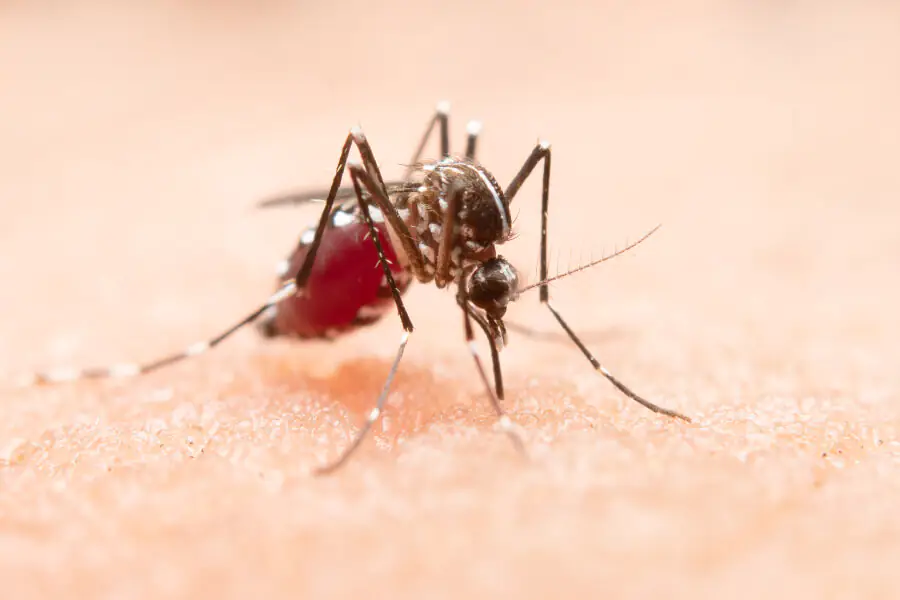Uh-oh, did a tiger mosquito just bite you? These tiny, striped invaders have been causing concern across Spain and beyond. Known for their aggressive biting behavior, tiger mosquitoes (Aedes albopictus) can be more than just an annoyance, they are carriers of diseases like chikungunya, dengue, and Zika. But do you really need to panic if you’ve been bitten?
Let’s explore what you should know about these notorious pests, how to stay safe, and when it’s time to seek medical help.
What Does a Tiger Mosquito Bite Look Like?
Their bites typically appear as small, red bumps, similar to other mosquito bites. The bites can be itchy and sometimes painful, especially if you have a more sensitive reaction.
The unique thing about it is that they bite during the day, particularly in the morning and late afternoon, unlike other mosquito species that are more active at dusk.
Their signature black and white striped legs are what give them the name “tiger” mosquitoes. So, if you see one of these distinctive mosquitoes, there’s a good chance you’ve just encountered a bite from this species.
Why Do Tiger Mosquitoes Bite Humans?
Like most mosquitoes, female tiger mosquitoes bite humans to obtain the proteins needed to develop their eggs.
Unfortunately, in the process of biting, they can also transmit harmful viruses. They thrive in warm, humid environments, making Spain a prime location for their spread. With the increase in global travel and climate change, also they have become a common pest in many parts of the world, including Europe.
How to Differentiate a Tiger Mosquito Bite
While their bites may not look dramatically different from other mosquito bites, they tend to be itchier and more irritating due to their aggressive nature.
Additionally, they often bite multiple times in one sitting, leaving behind several welts. If you’ve been bitten during daylight hours, it’s also more likely that the culprit is a tiger mosquito rather than a nocturnal mosquito species.
Common Symptoms
After they bite, you might experience:
- Red, swollen bumps on the skin
- Intense itching at the bite site
- Mild pain or irritation
- Multiple bites in one area
In rare cases, people may develop more severe allergic reactions, but this is uncommon.
Treatment and Relief
Home Remedies for Tiger Mosquito Bites
If you’ve been bitten, don’t worry! Most bites are harmless and can be treated at home with simple remedies:
- Cold compress: Applying an ice pack can reduce swelling and numb the area, helping to alleviate itching.
- Aloe vera: Known for its anti-inflammatory properties, aloe vera can soothe the skin and promote healing.
- Baking soda paste: Mixing baking soda with a bit of water and applying it to the bite can help neutralize the itch.
- Over-the-counter creams: Hydrocortisone cream or antihistamine lotions can be used to reduce inflammation and itching.
When to Seek Medical Attention for a Mosquito Bite
While most bites are harmless, there are instances where you should seek medical help. If you experience any of the following symptoms, contact a healthcare provider:
- High fever
- Severe headache
- Muscle or joint pain
- Unusual skin rashes
- Signs of infection at the bite site (pus, swelling, increasing redness)
These symptoms could be signs of a mosquito-borne illness like dengue, chikungunya, or Zika, all of which are spread by tiger mosquitoes.
Prevention Techniques
Tips to Prevent Tiger Mosquitoes Bites
Tiger mosquitoes are aggressive, but there are steps you can take to avoid their bites:
- Use insect repellent: Look for repellents containing DEET, picaridin, or oil of lemon eucalyptus. Apply to exposed skin, especially during peak biting times.
- Wear protective clothing: Long sleeves, pants, and socks can help reduce skin exposure. Light-colored clothing may also make you less attractive to mosquitoes.
- Avoid stagnant water: They breed in standing water, so regularly empty containers like flower pots, birdbaths, or buckets around your home.
- Install mosquito screens: Keep windows and doors screened to prevent mosquitoes from entering your home.
- Use mosquito nets: Especially if you are in a high-risk area, sleeping under a mosquito net can protect you from nighttime bites.
Best Practices to Avoid Tiger Mosquito Bites
- Stay indoors during peak biting hours: Early morning and late afternoon are when they are most active.
- Keep outdoor areas clean: Make sure that any outdoor space around your home is free of standing water and that trash is regularly disposed of.
Health Concerns
Do Tiger Mosquito Bites Transmit Diseases?
Yes, they are known carriers of several dangerous diseases, including:
- Dengue: A viral infection that causes high fever, rash, and joint pain. Severe cases can lead to dengue hemorrhagic fever, which can be fatal.
- Chikungunya: This virus causes fever and severe joint pain, and while it is rarely fatal, the symptoms can be debilitating and long-lasting.
- Zika virus: Most commonly associated with birth defects like microcephaly, Zika can also cause mild flu-like symptoms in adults. Pregnant women are especially at risk.
Potential Risks Associated with Tiger Mosquito Bites
While not every tiger mosquito bite leads to disease, it’s important to be aware of the potential risks, particularly if you’ve been bitten in an area where these diseases are common. In Spain, the risk of contracting these viruses remains relatively low, but travelers to tropical regions should take extra precautions.
Community Efforts
Reporting Tiger Mosquito Sightings in Your Area
In many regions, public health authorities encourage residents to report sightings of tiger mosquitoes. By notifying local authorities, you can help track the spread of these pests and contribute to community-wide efforts to reduce their population.
Initiatives to Control Tiger Mosquito Populations
Local governments and environmental agencies are taking steps to reduce its populations through public awareness campaigns, targeted mosquito control programs, and habitat reduction. You can contribute by keeping your home and garden free of stagnant water and using mosquito deterrents.
Conclusion
While a tiger mosquito bite can be itchy and uncomfortable, it’s not always a cause for alarm. However, given the potential for transmitting diseases like dengue, chikungunya, and Zika, it’s important to stay vigilant, especially if you live in or travel to areas where these illnesses are present. By taking simple preventative measures and knowing when to seek medical advice, you can protect yourself and your family from the risks associated with tiger mosquito bites.
FAQs
What happens if a tiger mosquito bites you?
Typically, a tiger mosquito bite causes redness, swelling, and itching. In some cases, it can transmit viruses like dengue, chikungunya, or Zika.
Are tiger mosquitoes in Spain?
Yes, tiger mosquitoes are present in Spain, particularly in coastal and urban areas where they thrive in warm, humid conditions.
Can mosquitoes in Spain make you ill?
While the risk of disease transmission is low in Spain, tiger mosquitoes can carry viruses that cause illnesses such as dengue, chikungunya, and Zika.
What to do after a tiger mosquito bite?
Treat the bite with a cold compress, aloe vera, or an over-the-counter anti-itch cream. If you develop severe symptoms like fever or joint pain, seek medical advice.







